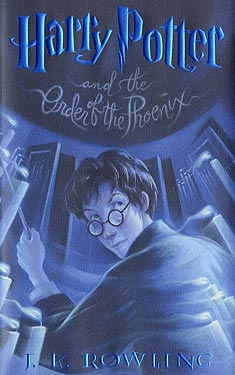JK Rowling
Completed 6/21/2015, Reviewed 6/22/2015
4 stars
Suffice it to say that each book in the series gets darker
than its predecessor. “Phoenix” is no
exception. The book opens with Harry and
his obnoxious cousin nearly being killed by Dementors. At Hogwarts, the new Defense Against the Dark
Arts professor physically and emotionally abuses him. The tie between Voldemort and Harry becomes
more terrifyingly real. And for a second
time, one of the characters dies.
Unfortunately, what is most memorable about this book is that Harry is
annoying, angry, and full of teen angst.
In a way, the book fits perfectly with its audience. Harry and his crew are now about fifteen
years old, the perfect age for teen angst. He is completely self-absorbed, making
everything incredibly difficult, from relationships with friends to learning
new ways to block his mind meld with Voldemort.
He screams, he shouts, he rages against the magic machine. He does what you’d expect for a boy of his
age in the situation he’s in. However,
in an 870 page book, it got a tiresome. I
lost my empathy and wanted him to just grow a pair. And that’s the sort of thing I usually don't think too
often. I usually can empathize with
powerlessness and internal rage. This
just went on too long. I felt like some
judicious editing could have made it more poignant, keeping me inside Harry’s
head rather than making me step outside and harshly judge him.
Ironically, I found the deliciously evil Dolores Umbrage a
lot more tolerable than I thought I remembered from my first read of the book. Her harsh physical punishments, her disbelieving
of his encounter with Voldemort, and her assumption that she is the absolute
authority brought back my memories of the evil teachers (nuns and lay alike)
from elementary school. So maybe I need
to give Harry a break, because even I wish I could torture Sister Ewalda,
Sister Terenia, and Mrs. Gora today, firmly believing that eternal torment in
hell is just not enough for them.
My favorite part of this book is the creation of Dumbledore’s
Army. Hermione comes up with this idea
as a way for the kids on Harry’s side to train in defense against the dark arts
in preparation for the threat of Voldemort and the Death Eaters. What I like particularly is that this is the
first time we really see Neville Longbottom succeeding in his wizard
training. Up to this point in the
series, he’s sort of a bumbling mess, being more accidently helpful rather than
intentionally. In the final climactic
scene, he still bumbles, but at least he’s a lot more confident. After four books of his focus being mostly
comic relief, his development here is very satisfying.
I give this book four out of five stars. It has all the elements to be mind-blowing,
including another exciting and devastating ending. I could have given this book five if it wasn’t
so filled with angst-ridden rage. If I
was fifteen when I first read it, it probably would have been my favorite book
in the series. Instead, my response to
Harry are the three words that I never thought I’d hear myself say: Get over it.

Harry's angst has always been what stood out most for me in this book as well, and coincidentally I am re-listening to it right now. What never occurred to me before and that I can't imagine isn't coincidence is that childred/teens who experience trauma often show signs through personality changes. Realizing that his sudden personality changes to the more annoying could be a reasult of the trauma of having Cedric die basically in his arms and having to fight the Dark Lord again has made my reading of his tantrums a hell of a lot more acceptable.
ReplyDeleteThanks for that insight Nikki! I know several people who said that they really understood his anger and angst. I felt like I was missing something because I didn't get it. Your simple and obvious explanation adds a lot to my understanding. I must remember this on my next reread.
Delete